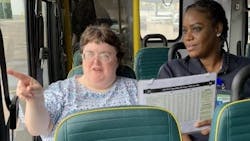National Aging and Disability Transportation Center awards $412,448 in competitive grant funding to develop plans to address transportation accessibility
The National Aging and Disability Transportation Center (NADTC) has awarded $412,448 in competitive grants for agencies to develop a transportation plan that addresses equitable and accessible transportation to meet the needs of underserved populations, especially older adults and people with disabilities in rural communities. NADTC awarded the grants to 12 communities including one Tribe and 10 states—Georgia, Kansas, Maine (two), Massachusetts, Michigan, New York (two), Montana, Texas and Washington.
NADTC notes the 12 grantees will each receive grants of up to $35,000 to engage in planning activities that identify transportation barriers, address current and future needs, establish multi-sector partnerships and actively involve older adults and people with disabilities. By the end of the funding period, grantees will develop a written plan to guide implementation of strategies supported by the community to increase the availability of accessible and equitable transportation services in their rural community.
“Easterseals is pleased to administer the FTA-funded NADTC, in cooperation with USAging," said Kendra Davenport, president and CEO, Easterseals, Inc. “The grant program provided through this national center is instrumental in supporting communities to conceptualize and implement innovative transportation and mobility solutions for people with disabilities and older adults. These solutions allow individuals to access the many places that are critical to health and well-being – principles espoused by the Easterseals National network."
“For older adults whose physical ability to safely drive has declined, having alternative transportation options is incredibly important,” said Sandy Markwood, CEO, USAging. “Transportation mobility enables independence, promotes good health, decreases social isolation and improves quality of life. These grants will not only help to serve the needs of the grantees’ communities, but will create plans that could be replicable in other communities as well.”
The 12 Rural Community Innovation Transportation Planning Grantees selected are:
- Aroostook Area Agency on Aging (Presque Isle, Maine) will develop a plan to address transportation barriers, including long travel distances and challenging winter conditions, impacting older adults and people with disabilities, including the Houlton Band of Maniseet Indians, in this large rural area in the northern part of the state.
- Benzie Transportation Authority (Beulah, Mich.) will develop a plan for improving access to health services for older adults and people with disabilities that integrates the scheduling of medical appointments with the scheduling and management of public transportation in rural Benzie County.
- Cortland County Planning Department (Cortland, N.Y.) will develop a plan to identify underutilized resources and solutions for increasing access to transportation among older adults, individuals with disabilities and their caregivers in underserved areas in their rural upstate community.
- Franklin Regional Council of Governments (Greenfield, Mass.) will develop a plan to identify the unmet needs of older adults, people with disabilities, people living with dementia, their caregivers and individuals facing social isolation and explore opportunities to expand their micro-transit system to other rural communities.
- Kickapoo Tribe in Kansas (Horton, Kan.) will develop a plan that identifies solutions for increasing access to transportation for medical appointments, official business and social opportunities, including a safe walking path for the Tribe’s older adults and individuals with disabilities.
- Living Independently for Today and Tomorrow (Billings, Mont.) will develop a plan to address the needs of older adults and people with disabilities across several rural counties and the Northern Cheyenne and Crow Agency Indian reservations, with the goal of increasing access to ADA accessible transportation to medical and essential government agency appointments.
- Penquis C.A.P, Inc. (Bangor, Maine) will develop a transportation plan that aims to reduce transportation barriers for older adults, people with disabilities and people who need frequent non-emergency medical transportation so they can be healthy, safe and connected to their community.
- Project Amistad (El Paso, Texas) will develop a plan in collaboration with their regional transportation planning committee that aims to increase availability, quality and access to transportation services with an emphasis on access to medical appointments and mental health services for older adults and people with disabilities in four rural, mountainous communities in west Texas.
- Snohomish County Transportation Coalition (Everett, Wash.) will develop a plan to identify solutions for increased access to transportation to older adults, people with disabilities and individuals with low income in the rural Skykomish Valley communities that currently have limited public transit options due to their remote location.
- Southwest Georgia Regional Commission (Camilla, Ga.) will develop a plan that aims to identify solutions for increasing access to and frequency of rides on public transit for older adults, people with disabilities and individuals with low income across this large rural region.
- Southwest Missouri Council of Governments (Springfield, Mo.) will develop a transportation plan to address challenges faced by older adults, people with disabilities and underserved areas in rural Webster County, including the Amish communities.
- The Arc Chemung-Schuyler (Watkins Glen, N.Y.) will develop a plan to identify transportation solutions for cross-county and regional trips, analyze ridership trends and increase access to transit for older adults, people with disabilities and individuals with low-income in this rural, scenic, upstate community.
